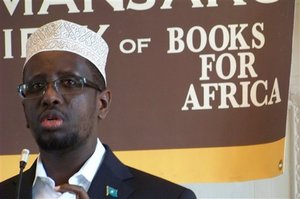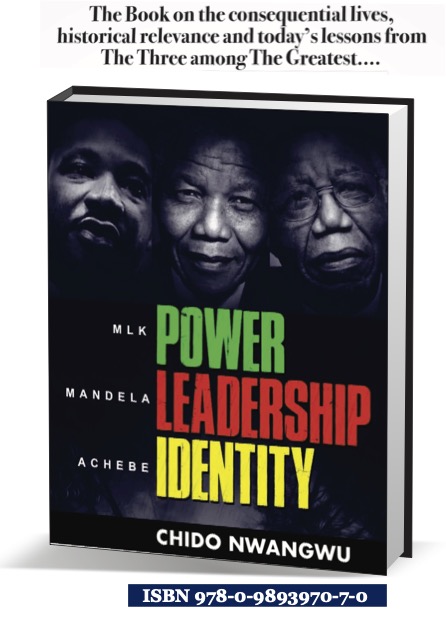
Somalia’s president meets with members of Minnesota’s Somali community; warns radical recruiters here in U.S
USAfricaonline.com wt reports by Amy Forliti/AP; and by Laura Yuen, Minnesota Public Radio
ST. PAUL, Minn. — The president of Somalia met with members of Minnesota’s Somali community Saturday (October 3rd, 2009) as part of a tour to build support for his tenuous government. President Sheik Sharif Sheik Ahmed told those at a Books for Africa event that he wants to find a solution to violence that has plagued his country for decades.
Speaking through an interpreter, he said the problems in Somalia are not clans fighting each other, but rather a “foreign idea” trying to take hold. A group called al-Shabab, which the U.S. says has ties to al-Qaida, is leading much of the fighting in Somalia. As many as 20 young Somali men from Minnesota are believed to have traveled to Somalia to fight. Three have died. Ahmed plans to head to Chicago and Columbus, Ohio, after Minnesota.
————
Somali president: Recruiters likely still in U.S.
by Laura Yuen, Minnesota Public Radio, October 3, 2009
St. Paul, Minn. — The president of Somalia said today he believes that recruiters who lured Minnesota men to fight with a terrorist group remain in the United States.
President Sheik Sharif Sheik Ahmed has been meeting non-stop this weekend with Somali-American community leaders in Minnesota as well as elected officials, including Gov. Tim Pawlenty.
Ahmed arrived in the Twin Cities Friday night as part of a stateside tour of communities with sizable Somali-American populations, of which Minnesota is the largest.
In an interview with Minnesota Public Radio News, Ahmed, who is an Islamic scholar, distanced himself from radical Islamists who are trying to oust his government.
Through a translator, Ahmed expressed sympathy for the young Minnesota men who returned to Somalia to fight. Six are believed dead.
“I’m very sorry about these people and how they’re misled,” he said. “The problem, I believe, is these people have little education about their religion. They have been misinformed. They do not know what is happening on the ground in Somalia. And the people who are providing this information to them are misleading them, and intended to do so.”
Ahmed says he has not been approached by the FBI, which is leading the investigation into the fighters.
The soft-spoken former schoolteacher will speak to thousands of Somali-Americans Sunday evening in Minneapolis to rally support for his fragile government.
Ahmed said he wants to remind Somalis that they have a responsibility to help solve the chaos of their homeland. The capital city of Mogadishu has been plagued with almost daily battles between government troops and extremist groups, including al-Shabaab, the group that is linked to al-Qaida and has recruited roughly 20 men from Minnesota to join its ranks.
While he is visiting Minnesota, Ahmed said he will try to tap the knowledge of successful Somali-Americans with expertise in public policy and project management. He hopes these educated professionals, who are “doers” rather than politicians, can serve in his government and help rebuild his country.
“We need many people with expertise, and we hope to take advantage of those who are present,” he said. “The most important thing is for them to understand they are needed by their homeland.”
Ahmed booked a busy schedule over the weekend, including a Saturday breakfast at the St. Paul-based nonprofit Books for Africa and private discussions with imams, college students, and intellectuals. He also visited with elected officials including Pawlenty and Rep. Keith Ellison, in hopes that they could advocate for Somalia here in the U.S.
Ellison said he supports the Somali president, who is “reaching out on all fronts to win friends for Somalia.” Ellison said he would work in Congress to help Ahmed’s government. He did not specify how, but said a stable Somalia is in the United States’ best interest.
“America is better off when transnational terrorists cannot establish a beachhead in Somalia,” Ellison said. “Our security and safety depends on Somalia’s security and safety.”
Several dozen Somali community members flocked the lobby of the St. Paul Hotel, where Ahmed and other members of his delegation are staying. Many hoped to gain some face time with the newly elected president.
Muqtar Dahir of Minneapolis said he was a former college classmate of Ahmed at a university in Libya. Dahir remembers Ahmed as a humble young man who listened well to others and paid for his own tuition.
“We were buddies and we used to hang together in the school, in the city, in the coffee shops,” said Dahir. “He’s humble, a very smart guy, and was not involved in any political situations. When he became president, I was so delighted. After 19 years of anarchy, it becomes clear that he is the right person to get Somalia out of the anarchy.”









